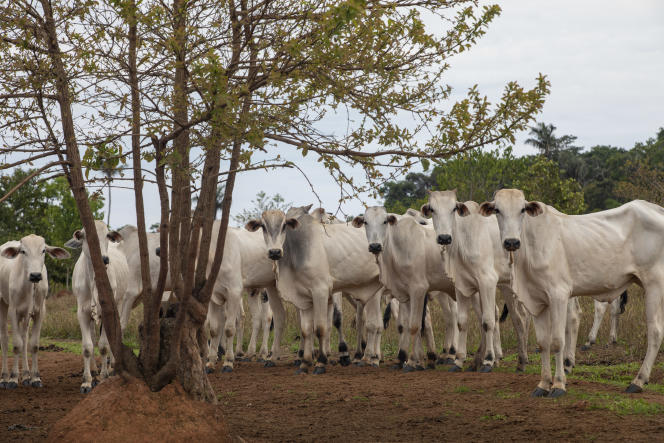JBS, Marfrig and Minerva: these names mean nothing to the French consumer. Yet the three Brazilian multinationals produce around 70% of the country’s beef exports. In 2022 alone, JBS says it has slaughtered an average of 75,000 cattle per day, for customers located in more than 190 countries. This beef is, by far, the main cause of deforestation in the Amazon. The subject had become one of journalist Dom Phillips’ hobbies. The correspondent of Guardianwho had made Brazil his adopted country since 2007, had devoted his last articles to the meat industry, before being assassinated, along with the expert on indigenous populations Bruno Pereira, on June 5, 2022 .
While JBS is committed to achieving net zero greenhouse gas emissions by 2040, Dom Phillips recalled in his last article for the British daily, dated March 2021, that a large part of this objective could be reached if JBS put an end to the deforestation carried out by its suppliers in the Amazon”. The consortium of journalists brought together by Forbidden Stories to continue the reporter’s work reveals that, to meet demand from China, but also from Europe, the three multinationals he was investigating are still taking the risk of sourcing from farms responsible for deforestation.
JBS, Marfrig and Minerva have an obligation to ensure that their direct suppliers are not involved in illegal deforestation. But to hide the true origin of their cattle, some breeders move their animals from a “dirty” farm, linked to the destruction of the forest, to a “clean” farm – without deforestation – before the slaughterhouse. In 2020, Dom Phillips, for the Guardianin partnership with Reporter Brasil And The Bureau of Investigative Journalism, had brought to light a concrete example of this practice of “laundering”, and revealed a complicity between the multinational JBS and a breeder sanctioned for illegal deforestation.
“The Bruno and Dom project” published in three parts
On June 5, 2022, reporter Dom Phillips and expert on indigenous populations Bruno Pereira were killed in the Javari Valley, in the heart of the Amazon, in Brazil. The Forbidden Stories consortium, which pursues the work of murdered or threatened journalists, and sixteen media outlets from ten countries have joined forces to continue their investigations. After a year of investigation, they publish “The Bruno and Dom project”, in three parts, bringing to light the networks of illegal fishing which threaten the resources and the indigenous populations, the continuous exports of meat resulting from deforestation, and the sale, on social networks, of protected Amazonian land.
Bad practices that last
The survey coordinated by Forbidden Stories, in partnership with the newspapers that exposed this previous story, as well as the Dutch daily NRC and the German investigation agency Paper Trail Mediareveals that the breeder implicated in Dom Phillips’ investigation has not stopped his bad practices but has found a new customer to sell his meat: Marfrig.
From one multinational to another, meat from deforested areas can thus be sold to consumers, whether Brazilian or foreign. Because the country’s slaughterhouses export around 20% of their meat. About 1% of the total Brazilian production ends up in the European Union and the United Kingdom, a share that may seem small, but corresponds to approximately 100,000 tons per year.
You have 61.04% of this article left to read. The following is for subscribers only.
